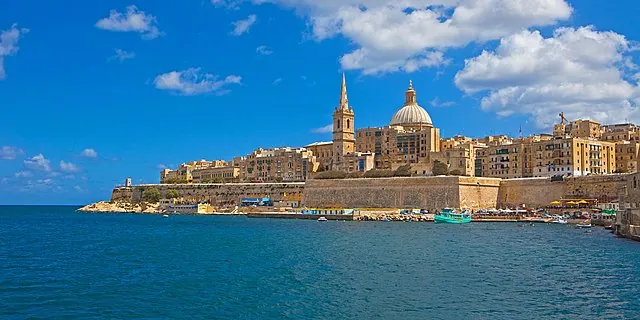“Maltese” refers to Malta’s diverse population, language, and culture. It is an island nation in the Mediterranean Sea with a rich history and a unique sense of self shaped by the diverse civilizations that have left their mark on its shores over time. Malta is renowned for its warm hospitality, vibrant festivals, and a strong sense of community. The island is attractive due to its Mediterranean lifestyle, spectacular architecture, and breathtaking scenery. Maltese culture is a captivating blend of history, language, and cuisine. Whether you are considering moving to Malta for its rich history, vibrant culture, or booming economy, this comprehensive guide will walk you through the step-by-step process of acquiring Maltese citizenship. From eligibility requirements to the application process and additional considerations, this guide has everything you need to know to make your dream of becoming a Maltese citizen a reality.
Why should one consider Maltese Citizenship?

There are several reasons to consider Maltese citizenship:
Global Mobility
A Maltese passport provides exceptional global mobility. The Maltese passport allows visa-free or visa-on-arrival entry to many countries. This makes international business and personal exploration easy.
EU Citizenship
Maltese citizenship grants full EU citizenship, which allows you to live, work, and study in any EU member state and travel visa-free within the Schengen Area. It provides access to European education, career opportunities, and personal growth prospects.
Political Stability and Rule of Law:
Malta is democratic and committed to the rule of law. Its political stability gives citizens and businesses confidence and peace of mind.
High Quality of Life:
Malta’s climate, sceneries, and cultural history make for a good life. With its calm pace, outdoor activities, and active social scene, the island’s Mediterranean lifestyle is gratifying and delightful.
Dynamic Economy and Business Opportunities:
Malta’s economy attracts enterprises and investment from diverse areas. Tax benefits, a trained workforce, and access to European and worldwide markets make it a good commercial location. Business and career options in Malta are enhanced by Maltese citizenship.
Healthcare and Social Benefits:
As a Maltese citizen, you are entitled to healthcare and social benefits. This offers comprehensive healthcare coverage and support services, improving your well-being and peace of mind. Ancient sites, medieval towns, and different traditions make Malta’s cultural legacy rich. Becoming a citizen can fully immerse you in Maltese culture, traditions, and holidays.
Dual Citizenship Option:
You can keep your original citizenship and Maltese citizenship in Malta. This can boost travel options, access to both nations’ resources and services, and personal and professional freedom.
Individual circumstances, ambitions, and personal factors should guide the choice to apply for Maltese citizenship. Before choosing Maltese citizenship, it’s best to research and get professional guidance.
Eligibility Requirements for Maltese Citizenship
To obtain Maltese citizenship, you must meet certain eligibility requirements set by the Maltese government. These requirements aim to ensure that individuals seeking citizenship have a genuine connection to Malta and are committed to becoming active members of Maltese society.
Here are the key eligibility requirements for Maltese citizenship:
Residency Requirement
Minimum Residency Period: Typically, applicants must establish continuous residency in Malta. As of my knowledge cutoff in September 2021, the minimum requirement was five years. However, residency requirements may vary, so it is important to verify the current regulations. You must maintain a physical presence in Malta during the residency period and adhere to immigration regulations. Any prolonged absences from the country might affect your eligibility for citizenship.
Financial Stability
You are typically required to demonstrate that you have sufficient financial resources to support yourself and any dependents in Malta. This can include proof of employment, income, or other financial assets.
Having gainful employment in Malta or a steady income source is often a key consideration in assessing financial stability. The authorities may evaluate your employment history, income level, and financial contributions to the local economy.
Language Requirement
You are generally required to demonstrate proficiency in either Maltese or English, as these are the official languages of Malta. The level of proficiency required may depend on the specific citizenship program or pathway chosen.
Language tests, such as speaking, writing, or comprehension exams, might be conducted to assess your language skills. However, certain individuals may be exempted from the language requirement, such as those with specific disabilities or medical conditions.
Good Character and Background Checks:
Applicants must have good character and provide evidence of a clean criminal record. This involves submitting police clearance certificates or similar documents from the relevant authorities in all countries where you have resided for a significant period.
The Maltese authorities will evaluate your character and conduct to determine your suitability for citizenship. Factors such as past convictions, involvement in illegal activities, or behavior inconsistent with Maltese societal norms might impact your application.
The Application Process for Maltese Citizenship
The application process for Maltese citizenship involves several steps and requires careful attention to detail. It is important to follow the process accurately to increase your chances of a successful application.
Here is a breakdown of the application process for Maltese citizenship:
Required Documents
Birth Certificates: Obtain your original birth certificate or a certified copy.
Identification Documents: Gather your valid passport or national identity card.
Marriage Certificates (if applicable): Provide marriage certificates if you have a spouse.
Proof of Residency: Collect documents demonstrating your continuous residency in Malta, such as rental agreements, utility bills, or employment records.Language Proficiency Certificates: If required, obtain certificates or evidence of your proficiency in Maltese or English.
Other Supporting Documents: Additional documents may be required depending on your circumstances, such as proof of financial stability, medical certificates, or character references. It is essential to review the specific requirements the Maltese government outlines carefully.
Submitting the Application:
Complete the relevant application forms accurately and legibly. You can get the forms from the Maltese authorities or download from their official website. Pay the required application fees, which may vary depending on the citizenship program or pathway chosen. Ensure that you submit the correct prices as specified by the Maltese government.
Application Review and Assessment:
The Maltese authorities will review the submitted documents to ensure they meet the required standards and fulfill the eligibility criteria. Only complete or correct information may delay or reject the application.
As part of the assessment process, background checks and interviews may be conducted to verify the information provided and assess your suitability for citizenship. These checks ensure your character, conduct, and adherence to Maltese laws and values.
Receiving Citizenship Approval
If your application is successful, you will receive an official notification of approval from the Maltese authorities. This notification will outline the next steps in the process.
You will have to take an oath of allegiance to Malta, which signifies your commitment to the country and its values. Once the pledge of allegiance is accepted, you will be issued a citizenship certificate, officially recognizing you as a Maltese citizen. This certificate is an important legal document and should be kept securely.
It is crucial to note that the application process for Maltese citizenship may vary depending on the specific program or pathway chosen, and the requirements may be subject to change. Consult the official website of the Maltese government or seek professional advice to ensure you have the most up-to-date and accurate information regarding the application process.
Maintaining Maltese Citizenship
Once you have obtained Maltese citizenship, it is important to understand the responsibilities and privileges that come with it. Here are some key aspects to consider for maintaining your Maltese citizenship:
Rights and Responsibilities of Maltese Citizens
As a Maltese citizen, you have the right to participate in the political process, including voting in elections and referendums. Stay informed about local and national issues to make informed decisions and exercise your democratic rights.
Maltese citizens gets consular assistance and protection from Maltese diplomatic missions abroad. You can seek support from the nearest Maltese embassy or consulate if you encounter legal issues, emergencies, or services while traveling or residing outside Malta.
Along with rights, citizenship comes with certain obligations towards Malta. These include obeying the country’s laws, respecting the local customs and traditions, and contributing to the welfare and development of the nation.
Passport and Travel Benefits
As a Maltese citizen, you can hold a Maltese passport, which grants you visa-free or visa-on-arrival access to numerous countries worldwide. The Maltese passport is highly regarded for its global mobility and facilitates hassle-free travel.
Malta is part of the Schengen Area, which allows citizens to travel freely across 26 European countries without border controls. This provides work, study, and leisure opportunities within the Schengen Area.
Dual Citizenship Considerations
Malta generally allows its citizens to hold dual citizenship, which means you can maintain your original citizenship alongside Maltese citizenship. However, it is important to check the laws and regulations of your actual country of citizenship to ensure they permit dual citizenship as well.
Dual citizenship may affect your rights, obligations, and privileges in your original country of citizenship. It is advisable to seek guidance from the relevant authorities or consult an immigration lawyer to understand the implications and requirements of holding dual citizenship.
Maintaining your Maltese citizenship requires staying engaged, informed, and responsible as a citizen of Malta. By understanding your rights and responsibilities, you can fully enjoy the benefits and privileges of being a Maltese citizen while actively contributing to the nation’s progress and development.
Additional Considerations for Maltese Citizenship:
When applying for Maltese citizenship, there are a few extra things to consider beyond the basic eligibility requirements and application process. Alternative citizenship routes, targeted assistance, and family protections are all factors to consider.
Let’s delve into the following factors further:
Automatic Citizenship
Citizenship by descent is available to those who can prove they have Maltese ancestry. In such circumstances, additional requirements come into play, such as presenting documentation of direct ancestry. It’s crucial to study the processes involved in acquiring citizenship through ancestry.
Malta’s Individual Investor Programme (MIIP) Citizenship by Investment:
Synopsis of the MIIP The Malta Individual Investor Programme (MIIP) is a second-class citizenship option for wealthy people. It calls for a serious financial commitment to Malta through home purchases, a monetary gift to the country’s National Development and Social Fund, and other expenditures. The MIIP has its application process, costs, and requirements separate from regular naturalization requirements.
Spouse and Dependent Citizenship:
Spouses of Maltese citizens may be eligible for citizenship if they meet certain requirements. The particular procedure and conditions depend on the length of the marriage and the residency status of the spouse.
Additionally, children under 18 with a Maltese parent or legal guardian may apply for citizenship on their behalf. Typical steps include gathering the required information and filling out the appropriate forms.
Dependent Adults and Other Exceptions:
Citizens of Malta may be able to help their disabled adult children or old parents gain residency or other legal status in the country. Each situation is handled individually, and there may be additional criteria and constraints.
Summary of ‘How to Obtain Maltese Citizenship’
In conclusion, before embarking on your journey to obtain Maltese citizenship, it is crucial to understand its significance. Maltese citizenship grants you the rights and privileges enjoyed by Maltese nationals, such as voting rights, access to healthcare, and the ability to travel freely within the Schengen Area. Additionally, Malta’s strategic location in the Mediterranean makes it an attractive destination for individuals seeking a high quality of life and business opportunities.
Additionally, becoming a citizen will immerse you in Malta’s rich history, diverse culture, and dynamic economy. Keep abreast of changes in Maltese laws and regulations that may affect your citizenship status or rights. Regularly check official government sources or consult legal professionals specializing in immigration and citizenship to ensure you are up-to-date with new developments.
Notify relevant authorities of any changes in personal details, such as address, marital status, or name, to ensure your records are accurate and up-to-date. DZ Advisory is a licensed company to help you get citizenship and residency in Malta. Contact them now for more details.







